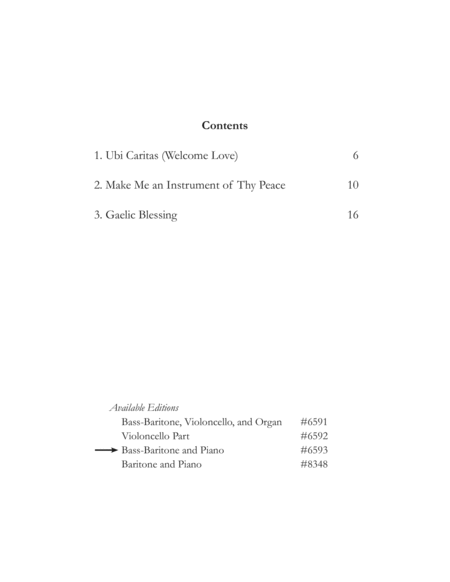Bass/baritone voice solo, violoncello and organ - Moderately Easy - Digital Download SKU: MQ.6593-E Composed by Gwyneth W. Walker. 21st century, prayer. Score. 19 pages. Duration 10 minutes. E. C. Schirmer Music Company - Digital #6593-E. Published by E. C. Schirmer Music Company - Digital (MQ.6593-E). English.The three songs Welcome Love (Ubi caritas), Make Me an Instrument of Thy Peace, and Gaelic Blessing are interconnected motivically yet distinct in meter, tonality, and message. These three songs are interconnected motivically, yet distinct in meter, tonality, and message. Peace and reverence flow throughout. The songs are for a bass-baritone. Commissioned in 2003 by David Arnold, a North Carolina bass-baritone who is a soloist in the 80-voice Chancel Choir at Centenary United Methodist Church in Winston-Salem. Mr. Arnold premiered these songs at Centenary with organist Ray Ebert and cellist Jennifer Alexandra Johnston on February 27, 2005. A new version for voice and piano was created in 2005. A transposition for lyric Baritone was added in 2015, commissioned by Ferris Allen (Baritone) and Linda Holzer (Pianist) of Little Rock, AR.The lyrics for Ubi Caritas are based on a new translation, by Christopher Brunelle, of the traditional Ubi Caritas Est Vera. A recurrent image in this translation is the gesture of welcoming: welcoming love, welcoming God, welcoming the friendly unfamiliar thought, welcoming Christ with us. The musical interpretation of welcoming is stepwise motion, either up or down, around a pitch center. Perhaps this might be heard as an opening of the door, or an opening of the heart.An interlude leads to the second song, Make Me an Instrument of Thy Peace, a musical setting of the Prayer of Saint Francis. The accompaniment is sparse, with material reminiscent of the welcoming pattern in the first song. This song alternates between triple meter for the thematic sections (Lord, make me an instrument of thy peace) and duple meter for the more recitative sections (O Divine Master...). The music ends as it began, with simple open fifths accompaniment, this time filling in the chords to express the fullness of the lyrics born to eternal life.A second interlude provides the bridge to the third song, Gaelic Blessing. The text for this song is a series of blessings for peace. The gentle chordal arpeggiations in the piano are intended to provide a peaceful accompaniment. [Once again, the stepwise intervals and recurrent regular rhythms relate to the first song.]In keeping with the simplicity and repetition of the text, the music is formed by a series of four-measure phrases (blessings). The blessings are similar in contour, each spanning an interval of a fourth. Growth is achieved through repetition and some dynamic contrast. However, the principal aesthetic of this song is constancy and gentle flow. Only at the end of the song, when the voice descends into the deep range, is the melodic contour altered, and dynamic contrast introduced. As the voice ends on low tones, the piano line rises, perhaps to the source of peace.Duration: 10 min.
